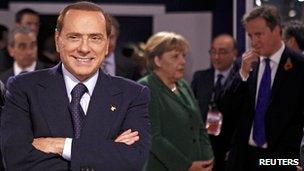Berlusconi on the rack
- Published
- comments

Tuesday's key vote could force Mr Berlusconi into a Greek-style political deal
The eurozone crisis - like a raging torrent - is destroying in its path Europe's leaders.
It did for Brian Cowen of Ireland. And for Jose Socrates of Portugal. Prime Minister Zapatero of Spain decided not to stand again and will be gone in weeks. George Papandreou of Greece fell on his sword at the weekend and Silvio Berlusconi faces a dangerous week ahead.
Italy is the focus of concern. It worries Europe's leaders and the financial markets much more than Greece.
The Italian crisis can be simply stated: the markets doubt that Silvio Berlusconi has the credibility to implement reforms to reduce the country's debt and promote growth. Without those steps the country is heading for that moment when its borrowing costs become unsustainable and it would need a bailout. The only problem is that its economy is so big - relative to Greece, Ireland or Portugal - the eurozone does not have the firepower to help it.
After the G20 meeting in Cannes last week we are no clearer to knowing how the main rescue facility - the EFSF - can boost its rescue fund to the trillion euros it had promised. Foreign investors are not tempted to enter the ring. And that leaves Italy - the world's third-largest debtor - vulnerable.
Which brings us back to Silvio Berlusconi. In his hour of danger he brims with confidence. Facing a crucial vote on the public finances he says "we have checked in the past few hours and the numbers are certain". But that cannot be. He may not even still have a parliamentary majority. MPs are deserting his coalition. Maybe as many as 30 are flirting with rebellion.
Support looks fragile
Now if he loses the vote on Tuesday he will face a confidence vote on Thursday. If he loses that he will be gone and the Berlusconi era will be over.
Even some ministers within his government believe his days are numbered. And some Italian papers which are his allies believe that this time it may not be possible for him to get a majority.
The past few weeks have not been good for Silvio Berlusconi. At the G20 he twice had to be nudged and woken up. In his comments he appeared detached, asserting only last week that "Italy does not feel this crisis". He went on to boast "the restaurants are full, the planes are fully booked and the hotel resorts are fully booked as well".
He is increasingly scornful of the very currency he is supposed to be defending. "Italians," he said, "have been impoverished since the introduction of the euro".
At the G20 he was forced to accept that IMF inspectors would visit Italy every three months to inspect the books. That is a national humiliation for a major European country.
Market pressure
His one-time friend and now political enemy Gianfranco Fini called on him to resign at the weekend, saying "the government must understand that it is not credible, even if it wins in parliament by a vote, because with a majority of one vote you can survive but you can't govern".
Silvio Berlusconi's skills at doing last-minute deals to win back defectors and discovering allies are legendary. But it is proving harder. Increasingly he is seen as the past and not the future.
The tipping point may be provided by the markets. They want clarity. They do not believe Berlusconi can deliver the reforms needed. The bond markets can be agents of fear. Borrowing costs are up to 6.4% and would have gone much higher had it not been for the intervention of the European Central Bank. If Italians believe they are heading for a bailout that will change the political landscape.
The prime minister rages against the plotters. He says an interim government with a "puppet as premier" would be unacceptable. The defectors would be "betraying the government and the country". Some of them are inclining towards a Greek solution - a government of national unity led by a technocrat. In the Italian case they point to Mario Monti as the stand-in, a former European Commissioner.
It only underlines how the eurozone crisis is becoming a crisis for European democracy.
It is also apparent that the leaders of France and Germany - who increasingly dominate the eurozone - want Silvio Berlusconi out.
Aged 75, he has vowed to stay on until his term ends in 2013. All of his survival skills will be tested in the days ahead.